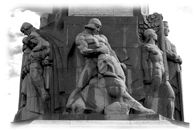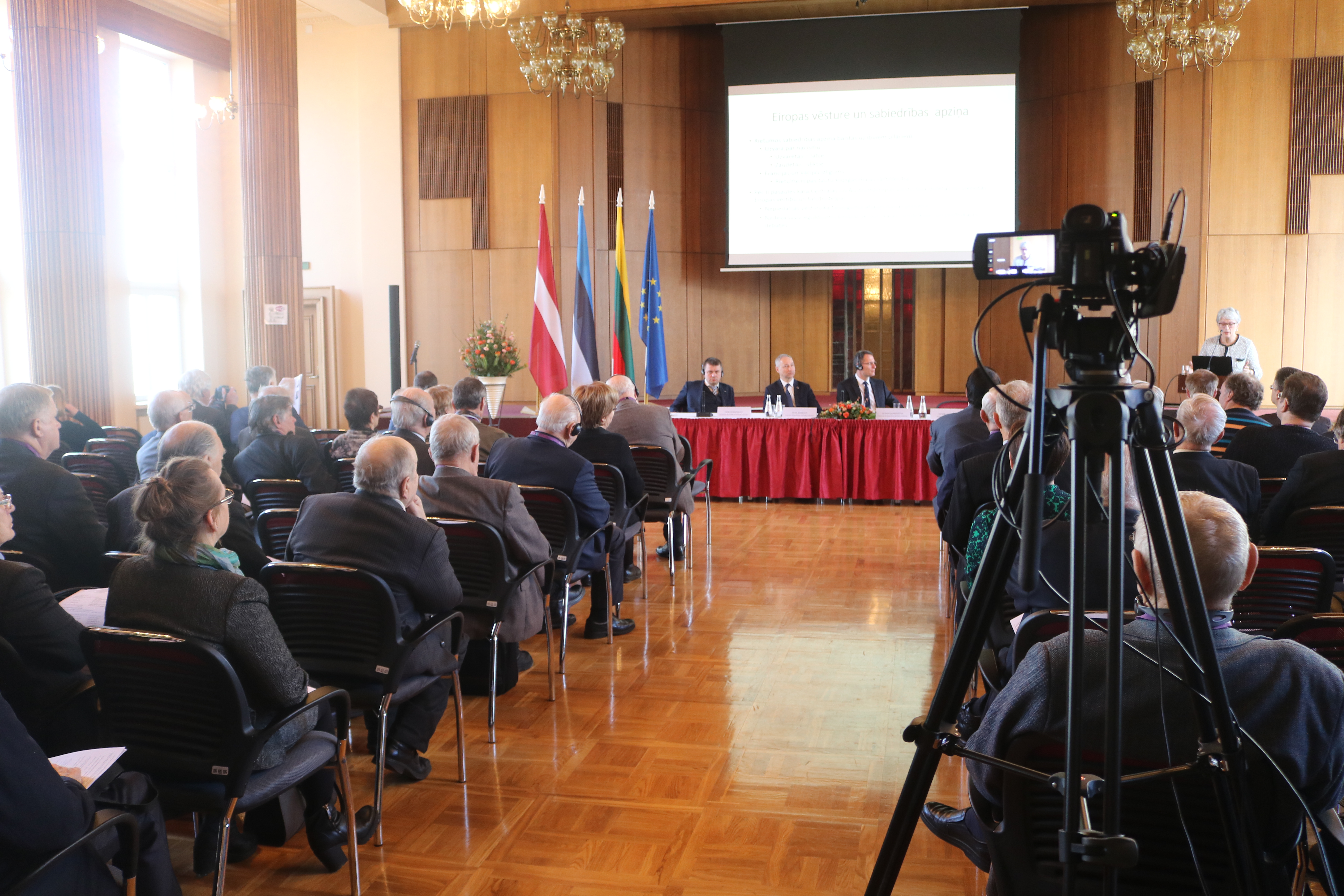The Identified Losses Inflicted by the Soviet Occupation in the Baltics”
22 March 2019, Ministry of Justice of the Republic of Latvia
AGENDA
| 9.30 | Registration | ||
| Opening of the Conference | |||
| Moderator – Edmunds Stankevičs, Chair of the Commission[1] | |||
| 10.00 | Opening Speech | Jānis Bordāns, Minister of Justice of the Republic of Latvia | |
| 10.10 | Opening Speech | Elvinas Jankevičius, Minister of Justice of the Republic of Lithuania | |
| 10.20 | Opening Speech | Urmas Reinsalu, Minister of Justice of the Republic of Estonia | |
| 10.30 | Member of the European Parliament (Group of the European People’s Party (Christian Democrats)) | Sandra Kalniete, Latvia | |
| Coffee break | |||
| The identified losses inflicted by the Soviet occupation | |||
| Moderator – Rolands Artūrs Bebris, the Deputy Chairman of the LOIB[2] | |||
| 11.20 | Soviet Occupation Regime in Latvia: Financial policy and its results | Gatis Krūmiņš, Latvia | |
| 11.40 | USSR financial policy in the occupation in Lithuania 1946 – 1990 | Vida Komičienė, Lithuania | |
| 12.05 | Losses inflicted to the Republic of Estonia by the USSR | Toomas Hiio, Estonia | |
| 12.25 | The identified demographic losses for the Baltic States | Ilmārs Mežs, Latvia | |
| 12.40 | The damage done to Lithuania by the USSR occupation | Birutė Burauskaitė, Lithuania | |
| 12.50 | Poland as a colony of the USSR | Dariusz Rogut, Poland | |
| 13.10 | Q&A | ||
| 13.20 | Lunch | ||
| Legal Aspects | |||
| Moderator – Inguss Kalniņš,
Adviser to the President of the Constitutional Court of the Republic of Latvia |
|||
| 14.00 | Legal Grounds for Demanding the Compensation for the Damages of Soviet Occupation | Dainius Žaļimas, Lithuania | |
| 14.20 | Legal possibilities to present a claim to remedy damages inflicted during Soviet occupation of the Baltic states: problems, cases, solutions | Silvija Gervienė, Lithuania | |
| 14.40 | The legal aspects of Latvia’s claim in respect of the compensation | Ieva Miļūna, Latvia | |
| 15.00 | Doctrine of continuity of states | Tālavs Jundzis, Latvia | |
| 15.20 | Q&A | ||
| Closing | |||
| 15.30 | Closing remarks | Ineta Ziemele, Latvia | |
Conference language – English/ Latvian/ English.
During the conference photographing and filming will be performed for live broadcasting purposes, without permission it is prohibited to take pictures or film[3].
Live broadcast of the Conference: https://www.youtube.com/watch?v=rRcoSkdbwk0&feature=youtu.be
[1] Latvian State Commission on Establishment of the Number of Victims and Locations of Mass Graves of the Totalitarian Communist Occupation Regime of the USSR, Collection of Information about Repressive Measures and Mass Deportations and Calculation of Losses inflicted on the Latvian Nation [2] Research Society of the Occupation of Latvia [3] Republic of Latvia Cabinet Regulation No. 496 Adopted 1 June 2010 "Procedures for the Identification of Critical Infrastructure, Including European Critical Infrastructure and Planning and Implementation of Security Measures
.
.
.
REMEMBRANCE DAY OF VICTIMS OF TOTALITARIAN REGIMES
TALLINN, 23 AUGUST 2018
UTOPIA UNACHIEVED DESPITE MILLIONS VICTIMISED? COMMUNIST CRIMES AND EUROPEAN MEMORY
ABOUT
In April of 2009, the European Parliament proposed in its resolution on European conscience and totalitarianism that 23 August be proclaimed as the European Day of Remembrance for victims of all totalitarian and authoritarian regimes. This resolution appealed to Europeans to remember millions of victims of authoritarian and totalitarian regimes, and thereby to promote democratic values.
This date also marks the 1939 pact between Hitler and Stalin, and the signing of its secret additional protocols. This pact opened the way for Hitler’s Germany to attack Poland and start the Second World War, while the two totalitarian regimes used the additional protocols to divide Eastern Europe into spheres of influence. In 1939 and 1940, Nazi Germany and the Communist Soviet Union occupied the countries and territories assigned to their respective spheres of influence and established regimes of terror that were hostile towards humanity.
The symbolic meaning of 23 August for the Baltic States is the reason why this year’s Day of Remembrance conference in Tallinn will focus first and foremost on the investigation of the crimes of communist regimes and remembering their victims.
National Socialist ideology, along with the Nazi regime’s crimes and their legacy have already been one of the pillars of Europe’s memorial culture and conscience for three quarters of a century. By now, the criminal nature of both totalitarian regimes is an academic and political consensual understanding. Yet alongside the unanimous international condemnation of nazi ideology and the crimes committed under its impetus, we must also pay more attention than before to the criminality of communist regimes and their hostility towards humanity.
With the 23 August remembrance day, we stress that one totalitarian dictatorship, its methods and ideologies, is not less dangerous than another, and that the investigation of totalitarian regimes and raising awareness of their hostility towards humanity is Europe’s joint responsibility. When we have raised awareness of the experience of all European peoples with totalitarian regimes, we will be able to protect freedom, democracy and human rights much better from both current and future dangers that emanate from ideologies that are hostile towards humanity.
PROGRAM
09:00 – 11:00
VISIT TO PATAREI PRISON
PS Excursions are full!
11:00 – 11:45
CONFERENCE REGISTRATION WITH REFRESHMENTS
Welcoming coffee for conference participants at the Estonian Film Museum
11:45 – 12:00
Gathering at the Memorial for the victims of communism
12:00 – 13:15
OPENING OF THE MEMORIAL FOR THE VICTIMS OF COMMUNISM
13:15 – 13:30
Gathering at the Estonian Film Museum
13:30 – 13:45
OPENING SPEECHES OF THE CONFERENCE
13:45 – 14:30
KEYNOTE SPEECH OF THE CONFERENCE
Richard Overy, historian, Professor of History at the University of Exeter
Considering the experience of Estonia and other countries under two totalitarian dictatorships, we ask: what can mankind learn from this today and in the future? What is the role of historical science in this?
14:30 – 15:45
PANEL 1 – WHAT IS COMMUNISM?
What is communist ideology: definition, points of departure and guiding principles? Why did communist ideology attract millions of people and why does it continue to do so? Why did terror become one of the dominant elements in implementing this ideology?
Richard Overy, historian, Professor of History at the University of Exeter
Nikita Petrov, historian, vice-chairman of the Board of Memorial`s Scientific Research Centre
Lauri Mälksoo, lawyer, Professor of International Law at the University of Tartu
Moderator: Andres Kasekamp, historian, Professor of History at the University of Toronto
15:45 – 16:05
COFFEE BREAK
16:05 – 17:20
PANEL 2 – A SPECTRE IS HAUNTING EUROPE
The Communist Manifesto begins with these words. Yet sooner or later, violence accompanied the building of ideal society everywhere. Nevertheless, the notion that the fault was not in the ideology but only in its inept implementers remains widespread in the 21st century as well. Can communist ideology be set apart from past attempts to implement it? Why does communist ideology find supporters nowadays as well, including from among politicians and intellectuals in free and democratic countries? Can this lead to an attempt to once again establish utopia by force and violence?
Sofi Oksanen, writer and playwright
Hannes H. Gissurarson, Professor of Political Science at the University of Iceland
Chrystia Freeland, writer, journalist, politician, Minister of Foreign Affairs of Canada (TBC)
Moderator: Riina Kaljurand, Research Fellow of the International Centre for Defence and Security and the Director of the Lennart Meri Conference
17:20 – 17:40
SUMMARY OF THE CONFERENCE + PRESENTATION OF THE COLLECTION OF ARTICLES
Göran Lindblad, Former Chairman Platform on European Memory and Conscience and former Member of the Swedish Parliament
17:40 – 19:00
EVENING RECEPTION
Evening reception for conference participants
MEMORIAL FOR THE VICTIMS OF COMMUNISM
The Memorial for the Victims of Communism is a more than 30,000 square meter remembrance site in Maarjamäe, Tallinn. The communism victims’ memorial and officers’ monument form a common garden of remembrance for victims of communism in Estonia.
The memorial plaques contain more than 22,000 names of Estonian people who were murdered or died as victims of communist terror and whose gravesites remain largely unknown.
The memorial grounds is made up of two parts – “Teekond” (Journey) and “Koduaed” (Home Garden). One needs to complete a journey to reach the garden. To embark on a journey, one must leave the garden.
The memorial is located next to the Maarjamäe Palace park, about 800 meters from Estonian Film museum. The entry to the memorial is from the Pirita road.
PATAREI PRISON
Patarei Prison is one of the most prominent symbols of Soviet political terror for people in Estonia. At the same time, it is a monumental site of memory of international importance that helps to understand and make sense of the hostility of totalitarian regimes towards mankind, regardless of the particular polity under consideration.
The Patarei complex was built in 1840 as part of the fortifications of Peter the Great’s Naval Fortress for the tsarist Russian state. The Republic of Estonia, which became independent in 1918, reconstructed it by 1920 as a prison, and it has been in use in that function until 2002. Over the course of the Second World War, Estonia came under the occupation of first the Soviet Union (1940–1941), thereafter Germany (1941–1944), and again the Soviet Union (1944–1991).
Throughout the Soviet period, a USSR security service prison operated in Patarei. Tens of thousands of victims of the communist regime passed through Patarei prior to their execution or before being sent to Gulag camps in the Soviet Union
The Patarei complex is one of the largest completely preserved classical style military structures in Europe.
The museum is planned to occupy the eastern part of the Patarei complex, where authentic prison cells, the room for executions by shooting, corridors, the prison courtyard with walking rooms for prisoners.
Read more about the history of Patarei Prison
After the Patarei prison excursion there’s a bus transfer organised from Patarei to the conference venue (Estonian Film Museum).
VENUES
Patarei Prison
Memorial for the Victims of Communism
Estonian Film Museum
***************************
*
*
*
Invitation to participate in an international conference organized by the Research Society of the Occupation of Latvia (LOIB)
The Baltics and Europe Under Soviet Military Power: Current View
Riga, 02 November 2012
Conference_Latvia_02112012
PROGRAMME_021111
“History and Memory. The Soviet Past – 1953-1990″
Date: November 28-29, 2011
Location: Seimas (The Parliament of Lithuania), Building No. III, Conference Hall, Vilnius, Lithuania
“Social, economic and environmental losses-damage caused by the Soviet Union in the Baltic States”
Date: 17-18 June 2011,
Location: The Academy of Sciences of Latvia (ASL), Great Conference Hall, Akadēmijas laukums 1, Riga, Latvia




